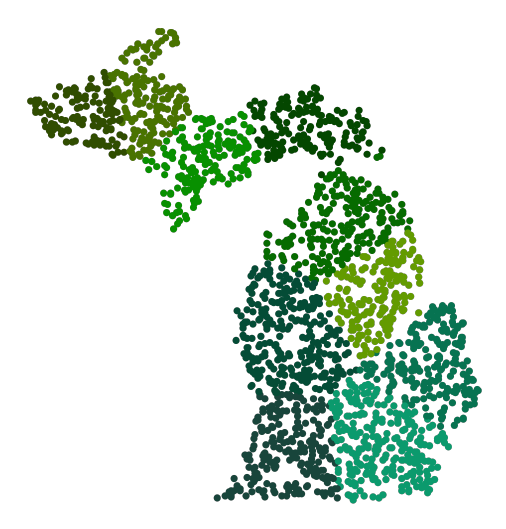The MSU Bioinformatics Core is a collaborative team of bioinformatics experts from the Institute for Cyber-Enabled Research (ICER), the Research Support Technology Facility (RTSF), and the Kellogg Biological Station (KBS). Together, we leverage our diverse expertise to advance bioinformatics research at MSU and beyond.
Our mission
The Bioinformatics Core supports research by analyzing complex omics data, integrating data generated using diverse methodologies, and delivering insightful biological context to enhance scientific findings. Our support spans the entire research process, from experimental design to constructing and maintaining reproducible workflows, manuscript writing and review, grant support letters, and providing comprehensive training for researchers at every career stage.
Why collaborate with a bioinformatician?
As bioinformaticians, our expertise in computational analysis equips us to identify and address challenges that may not be readily apparent to investigators. Our role extends beyond simply applying the appropriate analyses; we are committed to ensuring investigators understand the processes, rationale, and interpretation of results. Through collaboration with our team, investigators can expect high-quality, reliable data produced with rigorously tested methods that withstand the scrutiny of peer review.
Our process
Initial Consultation
All bioinformatics core services include a free consultation meeting prior to any analysis. We discuss what services we offer, assist with experimental design, and answer questions you might have. For more information about planning a project with us, see our policies page.
Analysis
Following the initial consultation, we will generate a roadmap that outlines the overall analysis strategy including what services are required, what workflows will be used, what results and reports will be provided, as well as any additional support, such as manuscript review, grant support, and assistance with providing data to public repositories. For more information see our services page.
Follow-up Meeting
Following the delivery of results, we meet with researchers (faculty, staff, post-docs and graduate students) to answer follow-up questions.
Request a Consultation
To request a consultation fill our consultation request form. Click the link below, and log in to the Help Center or sign up for an account. Please include key experimental details including data type (RNA-seq, ChIP-seq, genomic DNA, single-cell, etc.), desired analysis (differential expression analysis, peak calling, variant calling, etc.), species, the expected number of samples, and the timeline for sample submission.
Visit our help desk and office hours
Have you hit a road block while running your own bioinformatics analysis? Visit our Microsoft Teams Help Desk channel and our weekly office hours for free advice. Office hours are Tuesdays from 2pm-4pm virtually (https://tinyurl.com/54dezh59) and in person in the ICER offices in BPS (567 Wilson Rd, East Lansing, MI 48824, Rm 1440).

